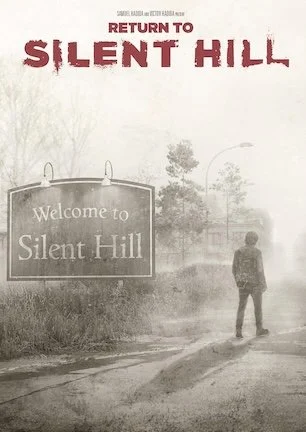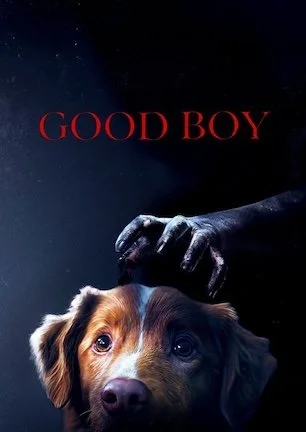Studio: Shout Studios
Director: Harold Holscher
Writer: Harold Holscher
Producer: Jac Williams
Stars: Tshamano Sebe, Inge Beckmann, Keita Luna, Garth Breytenbach, Chris April, Luxolo Ndabedi, Owam Amey
Review Score:
Summary:
A South African family moves into a farmhouse haunted by a man whose desire to resurrect his dead daughter turned him into a demon’s reluctant emissary.
Review:
Somewhere in remote South African countryside in 1977, William and Sarah are giving themselves and their recently orphaned niece Mary a fresh start. Following his father’s unexpected death, William inherited his family’s vacant farm. The sprawling property keeps all-thumbs William busy with countless fixer-upper projects while providing much-needed tranquility for the entire family.
Then Lazarus arrives with a large leather sack slung over his shoulder. Ominously outfitted like a Dark Tower gunslinger in a wide-brimmed hat and dirty duster, Lazarus claims to have once worked for William’s father. Despite an unsettling suspicion Sarah has about Lazarus, William could use the mysterious man’s help getting the house in shape. Besides, Lazarus already befriended Mary with colorful legends about how her worm collection can transform into moths capable of carrying human souls, just like those of her dead parents.
Lazarus knows a thing or three about death in the family and harvesting spirits. Local rumors recall that Lazarus, distraught over the fiery death of his daughter, tried resurrecting the girl only to end up an unwitting servant of the demon Uthuli. Lazarus now wanders the hills, plains, and forests in search of souls for Uthuli, whose pretzel-twisted body hides in the bag on Lazarus’ back.
Cautious whispers rise again when villagers learn Lazarus returned to their land. Conflicted by his inherit kindness, Lazarus doesn’t wish to be the ostracized outsider he was cursed to become. But Uthuli’s insistence on feeding means Lazarus has little choice but to keep his sights trained on the trio, only one of whom detects the darkness Lazarus brought to their home.
Previously titled “8: A South African Horror Story,” “The Soul Collector” is as visually rich as gothic chillers get. David Pienaar’s gallery-ready cinematography hones each shot with such detailed sharpness, it feels like images could be capable of cutting a viewer’s eye. Panoramic landscapes fully immerse wide environments in a unique time and place that’s breathtaking to behold. Although as alluring as the rolling country scenery can be, “The Soul Collector” does become overly obsessed with excessive establishing shots, presenting only the first of the movie’s plentiful problems with pacing.
A narrative that’s just as vividly realized heightens the setting’s lushness. The story swims in South African-specific lore about “sangomas” (witch doctors), mystic soul transfers, and purgatory planes between reality and death. Reductively, such elements aren’t dissimilar from what horror audiences are used to regarding demonic possession, reincarnation, and black magic bargains backfiring. Nevertheless, seeing themes involving resurrecting the dead, occult rituals, and shamanism framed through another culture’s superstitions freshens these frights so familiarity doesn’t become burdensome.
Performances hit for par on an adjacent green of technical excellence. Tshamano Sebe commandingly strangles his scenes by personifying a tragically tormented man who heartbreakingly panhandles for sympathy while also operating under a dark cloud of possibly ill intent. Sebe’s eyes, gait, and everything about how he adjusts his posture or extends his arms when interacting with little Mary (Keita Luna) balances invitingly paternal warmth with disquieting warnings to still be wary.
As Sarah, Inge Beckmann draws a short straw by having to be the person who is immediately uncomfortable with Lazarus for no apparent reason other than perhaps race. Because we know her reservations are warranted, this puts Sarah in a weird position of being right about Lazarus for the wrong reason, resulting in an uncertain attitude about how to take her too. Garth Breytenbach initially injects William with patient tolerance to get on our good side. Except the script kneecaps him as well by having subsequent scenes reduce William to a typically dismissive husband who waves a hand whenever his wife spouts another unbelievable assertion.
Uneven characterizations notwithstanding, “The Soul Collector” does so much so well that it’s a true pity to be unable to recommend the movie without caveats. Despite the musculature of a solidly streamlined setup, engaging performances, and arresting photography, “The Soul Collector” doesn’t have enough heat in its beat to breathe pulsating life into its spectacular but static shell.
It’s astonishing to realize the film runs only 100 minutes because it feels at least a full hour longer than it is. It’s not that the movie boringly drags its feet either. Trimming shots that linger too long wouldn’t lighten the load significantly. Forward movement stays mostly maintained even when plot points stop to sit and stew for a spell.
The issue is that the flame on the tempo’s long wick flickers so faintly, a black hole of “je ne sais quoi” opens to snuff out the slow build of suspense. So many sequences focus on atmospheric eeriness, e.g. oil lamplight passing shadows over furniture covered in dust cloths, stagnation smothers the story’s ability to consistently captivate. “The Soul Collector” disengages attention spans at each yawning turn that includes tiptoeing in darkness, bolting upright in bed after a nightmare, or another fleeting glimpse of something unusual that no one follows up on.
Absence of urgency creates an experience where it’s deflating to acknowledge overwhelmingly exquisite craftsmanship only to come away feeling unfulfilled on less superficial levels. Fearful folklore provides kindling. Strong acting strikes a spark. But screenwriting too reliant on mood to provide fuel forgets to energize the fire with gripping resonance. That turns out to be an unfortunate tragedy condemning “The Soul Collector” to wander an in-between world as it fights to find a fully self-aware spirit.
Review Score: 50






While the 110-minute runtime could use a trim to maintain more energy, “Redux Redux” is an easy recommend for anyone who enjoys low-key sci-fi.